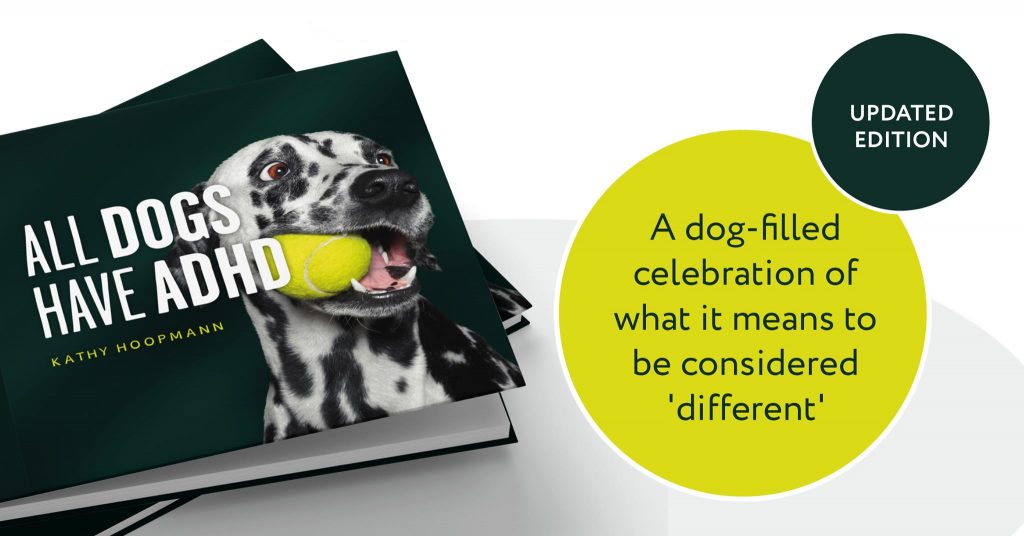Kathy Hoopmann stops by to talk about her updated release and how it can be used at home and in the classroom.

Can you briefly outline your writing background?
When a family member was diagnosed with Autism Spectrum Disorder over 20 years ago, the predictions were dire: no friends, poor schooling, no job, no partner. “NO WAY!” I said. I saw so much potential in these kids, so I starting writing books for children with an Asperger character. My first ASD book came out in 2000. Twenty years later I have 22 books published with translations into 19 languages.
What was the initial inspiration behind All Dogs Have ADHD? Why did you decide to create an updated version?
Back in 2006, I had just released All Cats Have Asperger Syndrome, and people kept saying to me, that if cats had Aspergers, then surely dogs had ADHD. It did not take me long to realize how apt that comparison was, and how special a book could come from that comparison. So, through a snapshot of a dog’s frenzied activities, I tried to capture the essence of the highs and lows of life with Attention Deficit Hyperactivity Disorder and thus, All Dogs Have ADHD was born and was released in 2009.
Fast forward 11 years and although All Dogs Have ADHD was still selling well, the layout was dated and some of the text needing tweaking to represent current views and terminology. The biggest criticism I had was that it was written with male pronouns, and as many girls also have ADHD, they also wanted to see themselves on the page. With these things in mind, I took the opportunity to freshen up the entire book, and revitalized it with all new images as well.
How do you see All Dogs being used in the classroom?
There’s a well known sales model that shows the steps needed to sell a product or change a mind set:

When I wrote All Dogs, I was slap bang in the awareness box and prayed that the other steps could flow on naturally. Although many people had heard the term ADHD, few really understood what that meant or how it played out in daily life. When teachers read this book to a class, not only do the teachers increase their awareness of the traits, trials, and triumphs of those with ADHD but so do their students. Suddenly that hyperactive kid becomes an interesting person in their own right. Someone to care about and have fun with. Then changes can come about in the way the teacher might organise their classroom or manage a lesson in a way that accommodates this child’s needs. Once other students recognise the reason an ADHD child does certain things, they can accept them more easily into friendship circles. So many positives can flow from this. The ADHD child’s self esteem grows and the class is enriched with their input.
Sue Larkey, an educational specialist has written a great resource for teachers that covers many ways this book can be used in the classroom. Check out her teacher notes at https://suelarkey.com.au/media/Activities_-_All_Dogs_Have_ADHD.pdf
How can parents use All Dogs either in a home school environment or as a way to engage their kids?
Snuggling up with children and reading them a book is beneficial in so many ways. It increases the bond between the parent and child as dopamines flow. Children can often concentrate much better when they feel wanted and valued. So this is a perfect time to discuss the points raised in the book. If the child has a diagnosis of ADHD then perhaps they can see themselves on the page and relate to a puppy that is lost or constantly loses things. If the book is read to raise awareness of a sibling or friend with the diagnosis, then again the visual aid of vibrant dogs promotes discussion which heightens their ability to understand and relate to that person.
What are some important lessons young people can take away from your book?
The most important lesson is that everyone is different and that all people have strengths that can be celebrated and weaknesses that need support. When we can understand why someone does something that we consider different or odd, then we are much more likely to accept and embrace that person.
Are there any additional resources you recommend for parents or teachers who want to create a more inclusive, welcoming environment?
It all comes back again and again to awareness. There are hundreds of sites on the web that can help. Google thing like ‘ADHD school resources’, ‘ADHD support groups’, or ‘ADHD parent groups’ to find help specific to your part of the world. There are numerous blog sites you can join to discuss issues and share stories. Jessica Kingsley Publishers have published many excellent books on the topic. Go to intl.jkp.com and search ‘ADHD’.
How can people contact you?

www.facebook.com/Kathy-Hoopman-Author-35538471291105